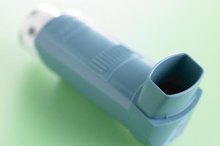Afrin Nasal Spray Ingredients
According to "Harrison's Principles of Internal Medicine," allergic rhinitis symptoms include: sneezing, runny nose, congestion and watery eyes 1. Seasonal allergic rhinitis, or “hay fever,” occurs due to allergens present in the air at specific times of the year.
If you are experiencing serious medical symptoms, seek emergency treatment immediately.
Afrin nasal spray, a decongestant, claims to relieve nasal discomfort caused by colds, allergies, hay fever, sinus congestion, and pressure 2. The mist pump product comes in Original, Severe Congestion, Extra Moisturizing, and Sinus. It reportedly acts within seconds, and the effects may last for up to 12 hours. Afrin contains an active ingredient and a number of inactive ingredients.
Oxymetazoline
According to Drugs.com, side effects include: sneezing or burning, stinging, dryness, or irritation of the nose, an allergic reaction manifested by difficulty breathing; swelling of the lips, tongue, or face; hives; seizures; unusual behavior or hallucinations; or an irregular, or fast heartbeat.
Do not use oxymetazoline nasal for longer than three days 3. Use only as directed. Frequent or prolonged use may cause nasal congestion to recur or worsen. If symptoms persist, consult a doctor, according to CFR.VLEX.com.
- According to Drugs.com, side effects include: sneezing or burning, stinging, dryness, or irritation of the nose, an allergic reaction manifested by difficulty breathing; swelling of the lips, tongue, or face; hives; seizures; unusual behavior or hallucinations; or an irregular, or fast heartbeat.
- Do not use oxymetazoline nasal for longer than three days 3.
Benzalkonium Chloride
Active Ingredients in Sinutab
Learn More
Benzalkonium chloride solution, a topical antiseptic, and inactive ingredient, serves as a nonmercurial antimicrobial preservative in nasal sprays. It prevents the growth of fungal, bacterial and viral pathogens.
According to ENT-CONSULT.com, benzalkonium chloride solution can cause rebound congestion similar to oxymetazoline hydrochloride 3.
Other Inactive Ingredients
Related Articles
References
- "Harrison's Principles of Internal Medicine"; Dennis Kasper, M.D.; 2005
- Vitacost: Afrin Nasal Spray
- Drugs.com: Oxymetazoline
- Dr. Grossan's Ear, Nose and Throat Consultant Pages: Nasal Saline Sprays
- Hakim M, Walia H, Rafiq M, Grannell T, Cartabuke RS, Tobias JD. Oxymetazoline metered dose spray: factors affecting delivery volume. J Pediatr Pharmacol Ther. 2016;21(3):247-51. doi:10.5863/1551-6776-21.3.247
- MedlinePlus, U.S. National Library of Medicine. Oxymetazoline nasal spray. Updated November 22, 2019.
Writer Bio
Based in New Jersey, John Riefler has been writing since 1987. His articles have appeared in "MD Magazine," "Emergency Medicine" and "Hospital Practice." Riefler holds a Bachelor of Science in biology from Bucknell University, a Master of Science in microbiology from the Medical University of South Carolina and a medical doctorate from St. George's University School of Medicine.









